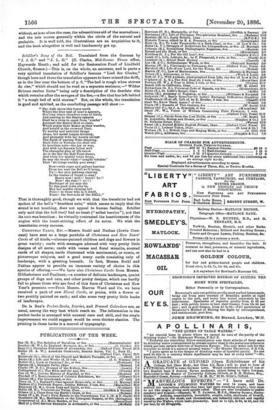Schiller's Song of the Bell. Translated from the German by
"J. J. G." and "J. L. G." (C. Clarke, Mid-Sussex Times office, Haywards Heath ; and sold for the Restoration Fund of Lindfield Church, Sussex.)—This is, on the whole, an accurate, and in parts a very spirited translation of Schiller's famous " Lied der Glocke," though here and there the translation appears to have missed the drift, as in the line near the bottom of p. 9, "The bed is rough when storms do rise," which should not be read as a separate sentence,—" Wilder Stiirme ranhes Bette" being only a description of the desolate site which remains after the ravages of the fire,—a fire that has left behind it "a rough bed of wild storms." Bat, on the whole, the translation is good and spirited, as the concluding passage will show :- "She, high above this lower earth
Where the blue tent of heavin appears, Hoviring where thunders come to birth, And nearing to the Starry-spheres Shall be a voice to speak from ' yonder' Amongst the Starry-Host so clear, Which praise their Maker as they wander, And herald in the crowned Year.
To worthy and nutrivial things Alone, her metal tongue devoting, And promptly with her hourly swings The flight of passing Time denoting.
Each Fate or Fortune she shall tell In heartless note—the joy or woe, And with her See-saw follow well The changeful play of life below.
As in the Ear the Bell-Voice wanes, And when her mighty tones decay, So may she teach—that—' nought remains' That ' all things earthly pass away.'
Now—with ropes and pulleys heaving From her nest the Bell we'll bring, Up !—her aery pathway cleaving In the realms of Sound to sine Heave now ! pull !! heave! ho!!
Now ! she rises !! so ! !! Harbinger of joy may sha To this good town ever be, May her maiden chiming tell Peace! to those who in it dwell, Peace! the first-note of the BELL."
That is thoroughly good, though we wish that the translator had not spoken of the bell's "heartless note," which seems to imply that the sound is not touching, does not appeal to human feeling. Schiller only said that the boll itself had no heart (" selbst herzlos "), not that -its note was heartless ; he virtually contrasted the heartlessness of the engine with the heart-stirring effect of its notes. We wish the translation every success.


































 Previous page
Previous page